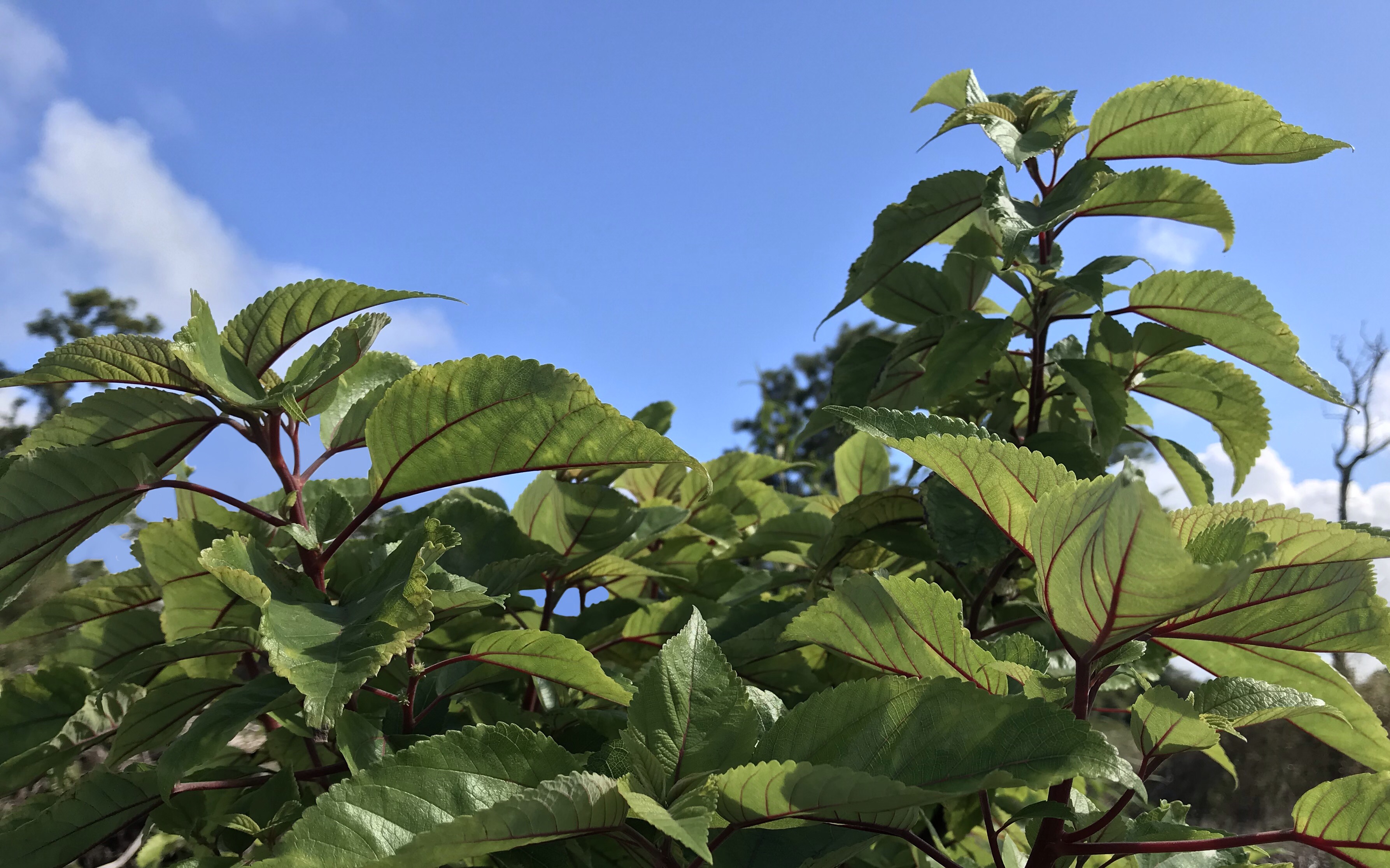
Māmaki
Māmaki (Pipturus albidus) is a shrub/ small tree found only in the Hawaiian Islands. Family to the nettle plant, Māmaki evolved in Hawaii over hundreds of years to lose the stinging hairs that characterize the nettle family on the U.S. Mainland and other parts of the world.
Māmaki is found on all the main Hawaiian Islands at an elevation of 500 to 5,000 feet. Māmaki is typically a small plant; however, given enough time in an ideal climate, māmaki can grow into a tree more than 20ft tall.
While Māmaki is mainly used for tea, it had many other uses in old Hawaii. One of the main uses of Māmaki was as a source of fiber to make kapa or a bark cloth. Māmaki was not easily cultivated but, was highly sought after as a fiber source, especially on the island of Hawaii. To make kapa, the inner bark was stripped from Māmaki stems and was pounded so the fibers would mesh together to create a strong cloth. The fruits and seeds of the Māmaki plant were also used. Māmaki fruits were used in healing sores and wounds as well as for treating children with thrush. Hawaiians used the fruits to aid stomach and digestive problems as well as to treat constipation.
Types of Māmaki
There are four main types of Māmaki(purple, hybrid, green and panaewa).

In old Hawaii, women primarily used the Purple variety but also used the Panaewa and Hybrid varieties. Women used the purple variety because it was believed to be better at treating ailments experienced by women such as PMS and morning sickness. Traditionally, men used the Green variety of Māmaki.
Traditional uses of the Purple, Panaewa and Hybrid Māmaki: Treat insomnia, irritability, PMS, morning sickness, helps with pain and swelling and aid to digestion
Modern uses: Blood and tissue cleanser from environmental toxins, diuretic to promote weight loss, to treat high blood pressure, diabetes and cholesterol
Traditional uses of Green Māmaki: high blood pressure, mild laxative, allergies
Modern uses: lower high blood pressure, prostate problems, allergies, high cholesterol and for diabetes
Medicinal Benefits*
Māmaki, a caffeine-free herbal tea, has been used by Native Hawaiians for many generations to treat internal illness such as: high blood pressure, high cholesterol, liver problems, depression, bladder problems, bladder infections, and PMS. Māmaki contains numerous disease fighting compounds including catechins, chlorogenic acid and rutin.
- Catechins: a type of phenolic compound (potent antioxidant) very abundant in tea, cocoa and berries. Catechins are natural antioxidants that help prevent cell damage and provide other benefits. These substances can reduce the formation of free radicals in the body, protecting cells and molecules from damage.
- Chlorogenic acid: a potent antioxidant found to reduce blood pressure, improve glucose regulation and protect against heart disease. It has been investigated for possible anti-inflammatory effects and studied as a possible chemical sensitizer to aid in respiratory allergy to certain plant materials.
- Rutin: a bioflavonoid, or plant pigment, that is found in certain vegetables and fruits. Rutin has powerful antioxidant properties and helps your body to produce collagen and use vitamin C. Rutin can help strengthen and increase flexibility in blood vessels, such as your arteries and capillaries. Strengthened blood vessels can improve your overall health. This may help ease related conditions, including bruises, spider veins, and varicose veins.
Brewing Instructions
1. Boil water.
2. Place one teaspoon of dried māmaki or māmaki blend into a teacup or mug.
3. Pour boiling water over leaves to fill the cup. We recommend 8oz of water per teaspoon of dried tea.
4. Let tea steep for 10-15 minutes. For a stronger tea, allow to steep for 30 minutes or over night in a refrigerator. For the best flavor we recommend allowing the tea to steep for 15 minutes.
Medical Disclaimer
All information regarding health and wellness on this site is provided purely for informational purposes and should not be considered medical advice. It is not intended to be used as the basis for treatment of medical problems or other health issues. Please consult a medical professional before using any product to treat your medical condition.
The information provided on this site is based on published research.
*These statements have not been evaluated by the Food and Drug Administration. These products are not intended to diagnose, treat, cure, or prevent any disease.
